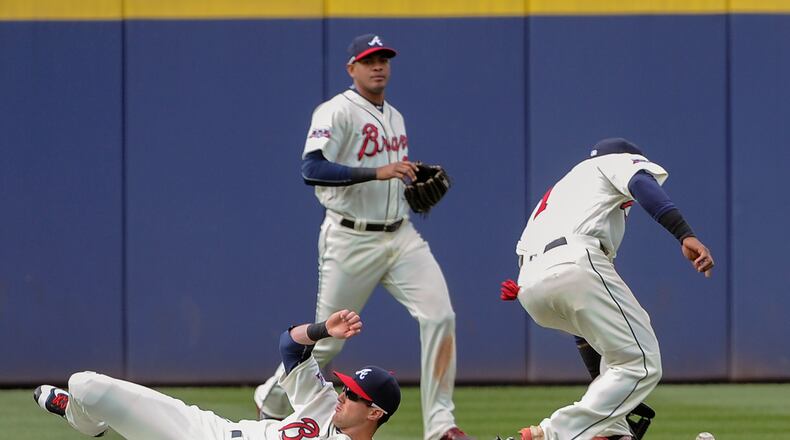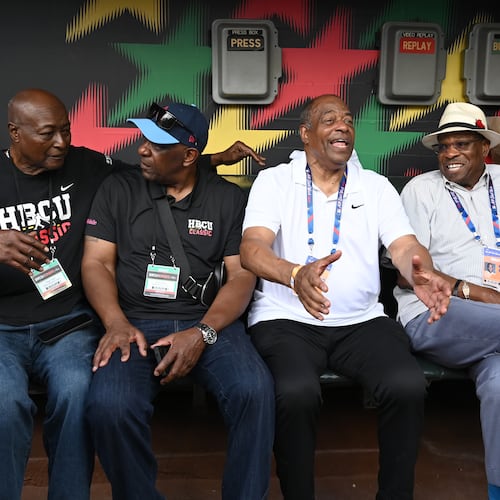Even if you understand why the Braves are doing this, losing is no fun. If you’re the guy largely responsible for this tear-down-to-build-up, losing is excruciating. When the crash came last summer and the Braves lost 19 of 20 games, John Coppolella was miserable. Couldn’t sleep. Barely ate. Woe was he.
Midway through that plunge, the Braves visited Wrigley Field. One of the Cubs’ higher-ups approached Coppolella, who would be promoted to general manager Oct. 1, and said: “We love what you guys are doing. But you can’t get discouraged. We remember how it was in 2012.”
That was Theo Epstein’s first season as Cubs president. On consecutive July days, Epstein traded two of his three best pitchers — Ryan Dempster and Paul Maholm — to contenders. (Maholm to the Braves, you’ll recall.) The Cubs finished the year with a rotation that included Chris Rusin, Chris Volstad and Justin Germano, owners of an aggregate career record of 55-100. Those Cubs lost 101 games.
Today the Cubs, who won 97 games last season, are seen as baseball’s most gifted team. They’re so laden with under-25 talent — Kris Bryant, Addison Russell, Jorge Soler, Javier Baez — that the loss of Kyle Schwarber to injury figures to be absorbed. Put simply, the Cubs are what the Braves hope to be.
The Astros lost 106 games in 2011, the season before Jeff Luhnow arrived from St. Louis, and got worse — 107 losses in 2012 and 111 in 2013. When Sports Illustrated ran a cover story in June 2014 declaring Houston “your 2017 World Series champ,” the baseball world tittered. Nobody’s laughing now. The Astros made the playoffs last fall. (Heck, SI might have undershot.)
The Braves have opened their season 0-5. This comes a year after they started 5-0 and still lost 95 games. They were terrible at the end of last season; they could be worse this time around. (Last year’s No. 2 starter: Shelby Miller. This year’s: Bud Norris.) Given that their schedule was front-loaded, nobody expected a flying start. Still, 0-5 is the worst Braves have done since 1988, when they finished 54-106.
If you’re Coppolella, you console yourself by noting that Dansby Swanson is hitting .294 with four RBIs for Carolina and that Sean Newcomb struck out five in five innings in his first start for Mississippi. These are the Braves of tomorrow, and they should — fingers crossed — be exponentially better than the Braves of today. If you’re Joe/Jane Doe of Anywhere, Ga., and you’ve paid to watch this alleged big-league team lose, you don’t give a fig about next year.
There’s a reason tanking/rebuilding is never done lightly: It’s awful to behold, and it’s an affront to your customers. It’s easy for a guy like me to say, “I believe the Braves are on the right track,” but — full disclosure — I don’t pay for my seat.
It would be better if tanking teams could say to MLB, “Since we’re not going to be trying hard to win the next few years, could we be taken off the schedule?” Alas, a team has to watch as its considered corporate course plays out over 162 games, all of which are televised. The notion of rebuilding can make great good sense. The reality is agonizing.
But having gone this far, what’s the alternative? Say the Braves traded their top 15 prospects for Clayton Kershaw and Miguel Cabrera. They’d have a great pitcher and a great pitcher, yes. They’d also be on the hook for $416 million in future salary for two guys. What the Braves are doing is smarter and cheaper and — we can only hope — better.
It will be a while until we see the fruits of this reset, with no guarantee they’ll be as bountiful as forecast. Until then, there’s not much to do except grin and bear it. (Or try Netflix instead.) As the Cubs’ man said last summer: Don’t get discouraged. Surely better days are ahead. Surely.
About the Author
Keep Reading
The Latest
Featured



